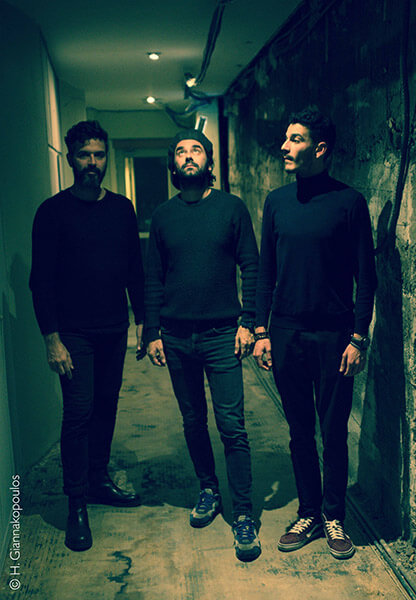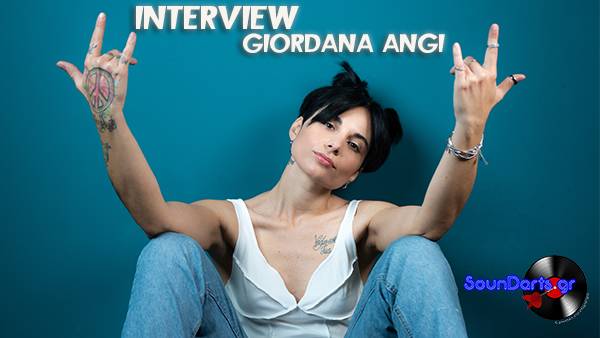Andreas Polyzogopoulos grew up in Samiko, a small village in the district of Ilia, Greece. In 2008 he released his debut album “Perfumed Dreams”, consisting of his first compositions. His next records include a tribute to his favorite band Pink Floyd (“Heart of the Sun”), followed by “Annica” (inspired by a 10-day silent meditation) and the ambient album “One Inch of Love”. After his stay at the Cité International des Arts in Paris, he moved to Brussels and began collaborating with Diederik Wissels, appearing on the pianist’s albums “Secrecy” and “Yearn” as well as the duet “Before You Go”. The European jazz scene is where Andreas developed his voice, taking risks, experimenting with trumpet timbres, rhythm, electronic effects and silence.
The internationally renowned trumpeter and composer, who never stops experimenting musically, presented shortly before the expiration of 2023 his fifth personal album entitled “Petrichor”, a contemplative, composed entirely of original jazz compositions, airy and deeply spiritual album. Andreas Polyzogopoulos on trumpet and effects creates, with the collaboration of Petros Klabanis on double bass and Wajdi Riahi on piano, a warm, spacious jazz soundscape, with a stable and dynamic rhythmic sense, despite the deliberate absence of percussion.
What are the feelings that led to the creation of this album? How does he describe his collaboration with Petros Klabanis and Wajdi Riahi and how important is silence in music and in his life? Why is it important for him to play the trumpet on a daily basis and how did he decide to dedicate himself to this wind instrument the most?
These and many more are some of the questions answered by Andreas Polyzogopoulos in the interview he granted to SounDarts.gr on the occasion of the release of his new album, “Petrichor”.


Just before the end of 2023, you released your new album “Petrichor”! What does this record mean to you?
Petrichor… The smell of the earth when the raindrops fall on it, after a period of drought. For me it is the smell of rain, the first rains and automatically the end of summer and the coming of autumn. I always wait for the first rain of September… I will not forget the first rain of 2003. I was in Sardinia for seminars with Paolo Fresu and one day after the end of the classes, the day many of us students would take the plane to Rome, the first rain came as we were outside the airport. It was a bittersweet feeling because I knew the summer was over but at the same time I had so much energy, new material and appetite for studying in the coming winter. This was the inspiration for the title and title track. The rest of the pieces are inspired by places, people, situations that make me feel something strong. I took my time on this album. There were several of the compositions already and I played them with various formations in Greece, France and Belgium but something was missing. I came back to Greece during covid and when we played for the first time, some of my tracks with double bassist Petros Klabanis I immediately felt that I should record this music of mine with him. In Brussels I played with the Tunisian pianist Wajdi Riahi and that’s how the trio was created.
Would you like to introduce us to these other two musicians who contributed to its realization, Petros Klabanis and Wajdi Riahi?
They are both excellent musicians and people, wizards on their instruments. They brought freshness, beautiful ideas, they immediately made my pieces their own and from the first moment we felt like a group. Erik Truffaz, who has written the liner notes of the album says it all in one sentence I think: “Your fellow travelers Petros Klabanis on double bass and Wajdi Riahi on piano, have a perfect rhythm and participate equally important in this dream that the three of you are planning”.
When someone takes a closer look at the background of the songs on the record, finds beautiful and important stories. Undoubtedly all the songs hold an important place in your heart, but for which one(s) are you most proud of and why?
I honestly can’t choose one right now. All are special to me and reflect some important event at a different time in my life. Maybe in a few years I will have singled out some. I can tell you that from the “Perfumed Dreams” album released in 2008, I can distinguish “Maar” and “Colores Feliz”.
In this record you brought an sense of “European jazz”. What made you experiment with your sound? Was it something you wanted to do or did it come out effortlessly?
Since the very first personal album I recorded, I think I played in a way that was quite influenced by “European jazz”. Since then I have continued on this path and it is something that comes out completely effortlessly. Very soon, after I started playing the trumpet I was introduced to the music of Markus Stockhausen and Paolo Fresu and it was clear that I wanted to follow that direction. Some time later I first heard Nils Petter Molvaer and discovered the Scandinavian trumpeters who inspired me to delve deeper into the timbres that the trumpet can produce.
The track “The Coldest Summer” from this album cannot go unnoticed. How did you end up creating this song?
This title is inspired by an article I read in a magazine a few years ago. While waiting at a radio station in Rhodes for an interview, I saw an article with the headline “The Coldest Summer”. He was referring to the refugees who are lost every year in the Aegean. After a few months and in the middle of a European tour, I was in Rotterdam and I accidentally saw on the internet the documentary “4.1 miles” by Dafni Matziarakis. Among others, it focuses on Captain Kyriakos Papadopoulos, who selflessly tries to save as many refugees as he can. I couldn’t stop crying and after a few minutes I started writing the piece on a tiny keyboard that I carry with me when I travel.
Silence can often be an answer to many things or give food for thought. Do you think that your instrumental creations have such results?
Both apply to this! Personally, silence gives me time to better weigh some situations and make the right decisions. Something similar applies to music. I often see a solo as a story. With the silence I have time to consolidate the previous phrase and play the next one choosing the best notes for the continuation of my story. Everyone feels different things when listening to music. Erik Truffaz writes about “Petrichor” that “your music honors silence and brings dreams” and that for me is the best compliment.
Looking back on your musical career, at what points do you think Andreas as a creator and musician has evolved and what would you like to work on more?
Looking back, decidedly and happily I have evolved in everything (technique, sound, improvisation, composition, music technology, orchestration, etc.) and I definitely want to evolve more in all of these! That’s the beauty of art, there’s always room for improvement, there’s always new things to learn, and I think that’s what keeps us on our toes. The trumpet, on the other hand, is an instrument that if you don’t study for two days, you immediately feel the difference. So I have decided that I will study for a lifetime
Since you mentioned the rumpet, how did you come to love this instrument and what was your inspiration to start studying it?
The trumpet entered my life when I was eighteen years old. I just heard Miles Davis playing “It never entered my mind” with a cup sordina and what I felt inside was so strong that I decided to learn to play this instrument. The next morning I went to a philharmonic. I tried to make a sound for the first time and that was it. I started learning trumpet as a second instrument (I played guitar from a young age), but it was very clear to me that I could express myself much more directly with this wind instrument. At that time I was going through a phase of searching for my future. I was in a theater group, I worked in a photography studio, for a period I was also preparing for fine arts, but when the trumpet entered my life, the whole landscape became clear immediately. Now it is an extension of myself, a mirror of my feelings. If I don’t play for a few days I feel really weird.
If you could imagine yourself 10 years from now, what images come to mind?
An Indian saying goes like: “Look at your thoughts in the past and you will see yourself today. See your thoughts today and you will see yourself in the future”. First of all, I would like to have health and time. I imagine myself playing good music with friends in beautiful places. Constantly evolving, creating new projects and being in love with music and the trumpet. I also imagine myself to have developed into my second great love, paragliding. To travel with friends and fly to beautiful places, to spend enough time in nature.
If you had to make the soundtrack of your life, what songs would you include in it?
Bring on the Night – Police | Dance me to the end of Love – Leonard Cohen | Time, Let there be more Light, Stay – Pink Floyd | Yesterday – Beatles | No surprises – Radiohead | Man gave names to all the animals – Bob Dylan | Child of Vision – Supertramp | Emporte Moi – Christophe | Avec le Temps – Léo Ferré | Voyage Voyage – Desirless | Vedrai, Vedrai – Ornella Vanoni | Ne me quitte pas – Jacques Brel | Amapola | El Ciego – Armando Manzanero | Το μινόρε της Αυγής – Μάρκος | Η μπαλλάντα των αισθήσεων και των παραισθήσεων – Μ. Χατζιδάκις | Της δικαιοσύνης ήλιε νοητέ, Στο περιγιάλι – Μ. Θεοδωράκης | Για το Καλό μου – Γ. Μηλιώκας | Πριν το Τελος – Βασίλης | Αλοτινές μου εποχές – Στέλιος | Παλιά πληγή – Θανάσης | Του Άρη – Πάνος Τζαβέλας | Δε χωράς Πουθενά –Τρύπες
So you just released “Petrichor”. What are your next professional plans?
At the moment I am involved with “Petrichor” and its presentation in summer concerts in Greece and abroad. At the same time I am writing new music for a more experimental format that I have in mind and soon I will start writing the music for a documentary about the refugees. There are always many projects in which I participate as a sideman and the stable trio with Giorgos Kontrafouris and Kostas Konstantinou where we pay tribute to the sound of Chet Baker.
What is your motto in life?
Now is the best moment of your life!
Interview: Thodoris Kolliopoulos




